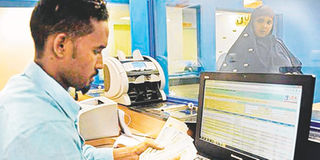Everyone wants to see a stable, peaceful and prosperous Somalia

A customer (right) waits to collect money at a money transfer centre in Mogadishu on February 12, 2015. PHOTO | AFP
What you need to know:
- The country is trying to overcome its legacy of 25 years of conflict and is gearing up for a one-person-one-vote poll in 2020. The upcoming elections have attracted interest, not only in Somalia but also in the region, as well as the international community as everyone wants to see a stable and prosperous country.
Somalia is heading to crucial presidential and parliamentary elections at the end of October that will define the strategic direction of the country for the next few years.
The country is trying to overcome its legacy of 25 years of conflict and is gearing up for a one-person-one-vote poll in 2020. The upcoming elections have attracted interest, not only in Somalia but also in the region, as well as the international community as everyone wants to see a stable and prosperous country.
There is still a lot that needs to be done, including empowering the Somali National Forces to secure Somalia. Currently, the forces are assisted by the African Union Mission in Somalia (Amisom). Somalia is indebted to the international community for its assistance to its men and women in uniform. Somali military personnel need proper training and regular and better salaries to prepare to take full responsibility for the country’s security after the exit of Amisom.
The problem of the growing number of unemployed youth needs to be tackled urgently. I believe this is the root cause of radicalisation of young people who join Al Shabaab and Al Qaeda. Resolving this needs a pragmatic approach.
Youth under 35 years constitute 74 per cent of the Somali population and nearly two thirds of them prefer to leave the country in search of a better life abroad because of lack of opportunities at home. Many have lost their lives in their desperate attempt to immigrate to Western countries. Yet Somalia’s greatest strength should be its young people and growing population.
The country has abundant natural resources, massive uninhabited land, two large rivers, and the longest coastline in Africa, with enormous marine and fishery resources. These can support vibrant and high-value agriculture and resolve the food and unemployment crisis.
The robust entrepreneurial spirit of Somalis can be effectively tapped through facilitating access to capital and financial skills training. Within a few years of focused efforts and smart investments by the government and other stakeholders, youth unemployment can be significantly reduced.
There has been massive deforestation in Somalia to feed the multi-million dollar charcoal trade. This has left the country bare and vulnerable to frequent droughts. The introduction of national reforestation programmes can stem this.
Somalia imports nearly everything, including food, even though some of these can be produced locally and create jobs. Smart government policies can reverse this.
The other crippling issues that need to be addressed include corruption and wastage of resources in government institutions. This is slowing down the rebuilding of the country and undermining efforts to provide services such as free education and hospitals.
It is imperative that leaders strive to unite the country. Once Somalis are united, it will be easier to collect taxes to fund infrastructure projects that can benefit the economy.
Somalia needs genuine reconciliation at the grassroots to overcome the emotional and psychological trauma and baggage that have accumulated over the past quarter century of conflict. Reconciliation efforts by successive transitional governments have not had the desired impact since they have mostly involved political and clan leaders and former warlords. They have failed because they have ignored the ordinary people at the grassroots.
Our country needs to empower women on the political and socio-economic fronts to enable them to participate in the reconstruction efforts. The upcoming polls hold promise for Somali women because 30 per cent of the seats in both the lower and upper houses of Parliament have been set aside for them. Women need to be in decision-making positions in all sectors of the public service, including the Executive. This will require political will.
The writer filed this article from Mogadishu




